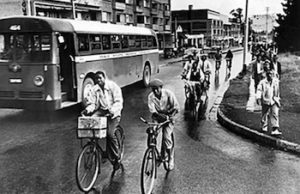
"United We Stood"
On this date in 1955, the Montgomery Bus Boycott occurred. This was one of the pivotal starting points of the 20th-century American Civil Rights movement.
In Montgomery, Alabama, segregation was a part of everyday life. Blacks who lived there faced Jim Crow Laws in parks, schools, restrooms, theaters, and buses. The country's laws made it hard for Blacks to register and participate in elections. The justice system discriminated against them, unjustly jailing and prosecuting many while banning them from public office.
One particular area of bitterness among Montgomery Blacks of that era was the segregation law of the bus system. Although Blacks were the majority, they were forced to adhere to oppressive bus conditions. The bus drivers, all of whom were white, treated Blacks with racist and abusive attitudes, often calling their passengers derogatory names such as "nigger,” "Black cow," and "Black ape."
They often required Blacks to pay their fares in front of the bus and then walk to the back door to board the bus. Sometimes, bus drivers would take off before the passengers could get on, leaving their passengers behind. While this practice often angered Blacks, the practices of "White-only" seating angered them even more. The law stated that Blacks could not sit in front of the bus, regardless of whether the seats were empty.
After Rosa Parks was arrested on December 1, 1955, the news of this event spread to the Black community. Community members decided that a boycott of the bus system was long overdue. Jo-Ann Robinson of the Women's Political Committee began to organize a one-day protest. When the word spread about the protest, several other Black leaders wanted to convene.
An organized movement got underway under the leadership of E.D. Nixon, former chair of the NAACP of Alabama, Martin Luther King Jr., Ralph Abernathy, H.H. Hubbard, and Ms. A.W. West. The Montgomery Improvement Association (MIA) was formed, with King as its leader. The MIA adopted a plan of action for the protest that was officially to begin on December 5. The resolution stated three demands: 1) Blacks would not ride the buses until polite treatment by bus drivers was guaranteed. 2) Segregation must be abolished on buses, and a first-come-first-served policy must be adopted. 3) Black bus drivers must be employed. Deciding that they could no longer fight the county of Montgomery, Black leaders filed a federal lawsuit against Montgomery's segregation laws because they were not by the 14th Amendment.
On May 11, 1956, the case was heard before a three-panel federal court. About three weeks later, in a two-to-one decision, the court decided that the segregation laws were unconstitutional. The Montgomery County lawyers immediately appealed the decision in the Supreme Court. The protest continued while the boycotters waited for the Supreme Court to rule.
During that time, incidents tried to intimidate the leaders into ending the movement. Reverend Robert Graetz, a white minister serving a predominately Black church, had his house bombed. The mayor denounced the incident as a publicity stunt by Blacks and reiterated that whites did not care if the boycott lasted forever. Harassment by cops increased, and insurance policies continued to be canceled. The law made it almost impossible for the carpool system to take place. Eventually, the city filed suit against leaders of the movement, citing that the carpool was a "public nuisance" and an illegal "private enterprise." On November 13, 1956, leaders readied to face one of the darkest days of the movement, knowing that without the carpool system, people might be forced to ride the buses.
While waiting for the decision about the carpools in Montgomery, King received a message from the federal court. It simply stated that "the motion to affirm is granted and the judgment is affirmed,” meaning that the Supreme Court supported the decision that segregation on the buses was illegal. The next night, the official boycott was called to a conclusion, but it was soon revealed that the order would not reach Montgomery for about a month. Faced with the obstacle of being unable to participate in carpools, a “share a ride” system was worked out, and the buses remained empty for another 30 days.
The mandate came to Montgomery on December 20, 1956. The next day, King, Abernathy, and Nixon were the first to integrate the buses. The boycott was over.
Encyclopedia of African American Culture and History
Volume 1, ISBN #0-02-897345-3, Pg 175
Jack Salzman, David Lionel Smith, Cornel West